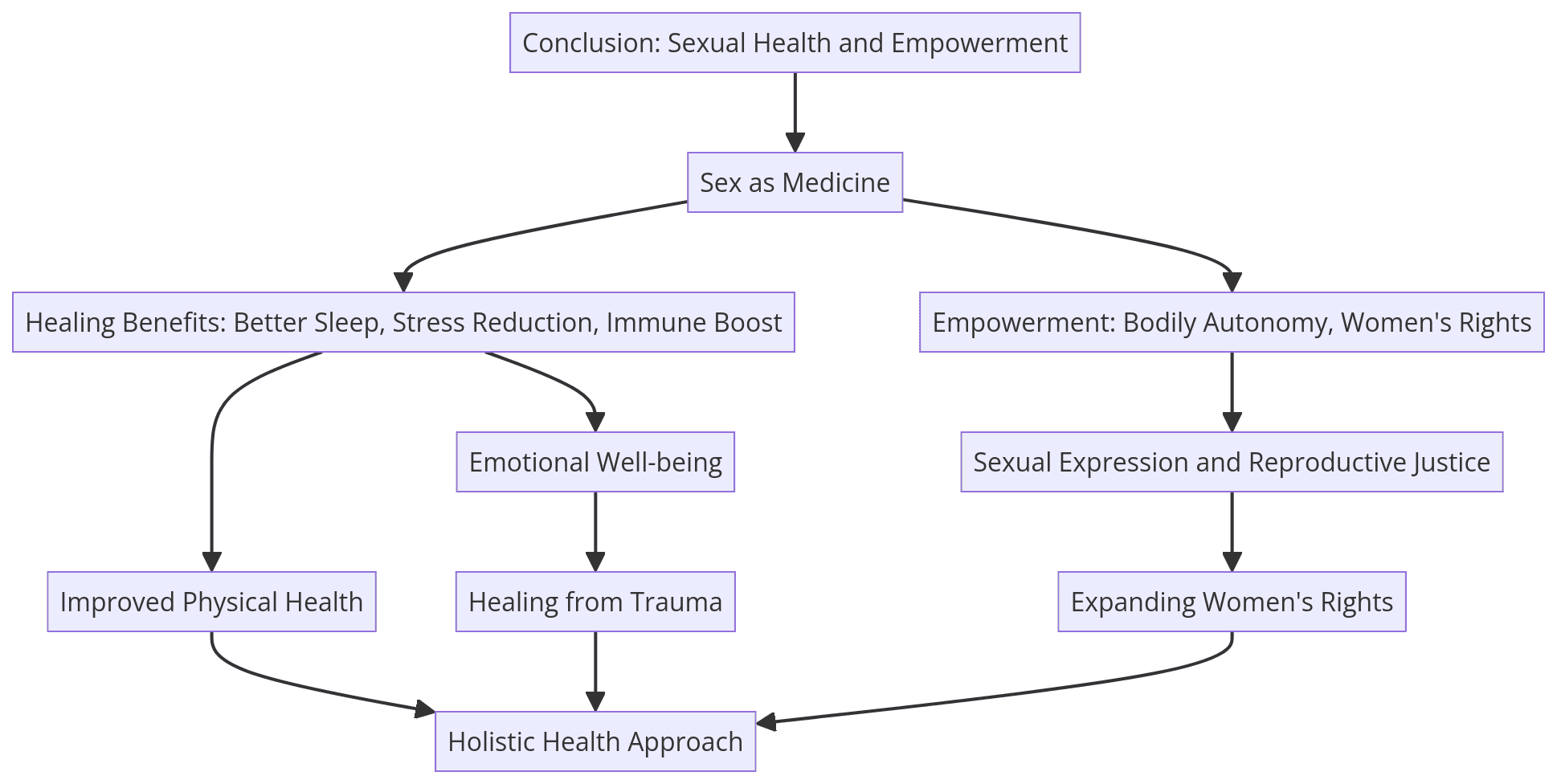

On September 29, 2024, David Thompson of Science Times, delivered a compelling message about how sexual health and pleasure are intricately connected to women’s healing and empowerment. The article discussion revealed groundbreaking research in sexual science and the importance of integrating sexuality into modern healthcare, especially for women’s health. While science proves the healing power of sexual pleasure, societal stigma remains a major obstacle.
In today’s climate, where reproductive justice is an ever-present topic, the conversation is evolving. No longer is the focus limited to abortion rights or contraception. Now, the role of sexual health and pleasure in women’s lives is gaining prominence. Pioneering researchers like Dr. Nicole Prause demonstrate how sex acts as a potent healing tool for the body and mind, challenging traditional beliefs and pushing forward women’s rights.
Science Is Revealing the Healing Power of Sex, But Stigma Endures
Time Interval: Full Article Summary
Summary:
- 🔬 Emerging Research: Pioneers in sexual science are uncovering the link between sexuality and women’s health, but societal stigma hinders its full acceptance.
- 🧠 Sexual Healing: Studies, led by researchers like Dr. Nicole Prause, highlight how sexual pleasure can positively impact physical and mental health. Benefits include improved immune function, reduced stress, better sleep, and even lower cancer risks.
- 💔 Trauma and Healing: Research on Orgasmic Meditation (OM) reveals that it helps survivors of sexual trauma experience healing and empowerment, challenging the stigma surrounding sexuality.
- ⚖️ Reproductive Justice: The movement expands beyond abortion rights to include bodily autonomy, sexual expression, and the right to pleasure, which are often neglected in discussions of women’s rights.
- 🏛️ Backlash and Challenges: Despite scientific progress, societal prejudice and attacks against researchers like Dr. Prause highlight the ongoing resistance to accepting sexuality as a vital part of women’s empowerment and health.
The Healing Power of Sexual Pleasure and Women’s Empowerment
At the forefront of this discussion is Dr. Nicole Prause, a leading researcher who has spent years investigating the health benefits of sexual pleasure. Her work, along with others in the field, reveals how orgasms contribute to better physical health by boosting the immune system, reducing stress, improving sleep, and even lowering the risk of certain cancers. These benefits underscore the profound connection between sexual pleasure and women’s well-being.
More strikingly, Prause’s research into Orgasmic Meditation (OM) has opened new doors for trauma survivors. Women who have experienced sexual trauma often face long-term emotional and physical challenges. Through OM, a therapeutic practice that emphasizes clitoral stimulation, women are able to reclaim their bodies, reduce anxiety, and foster a sense of connectedness. This revolutionary practice challenges societal taboos around female sexuality, showing that sexual health is not just about pleasure—it’s about empowerment and healing.
Below is a mind map summarizing the health benefits of orgasm for women:

The mind map highlights the various positive effects orgasms have on stress reduction, immune function, mood improvement, and trauma healing, supporting the argument that sexual pleasure is integral to both mental and physical health.
Reproductive Justice: Expanding the Conversation
The concept of reproductive justice is evolving rapidly. While the movement has long focused on the right to choose and access to contraception, it now embraces a broader understanding of women’s rights. At the heart of this is the idea that sexual pleasure and expression are crucial components of bodily autonomy.
In the wake of the Roe v. Wade reversal, many American women fear for the security of their reproductive freedoms. But as visionaries like Dr. Prause emphasize, reproductive justice goes beyond the right to abortion—it includes the right to experience sexual pleasure and freedom. For many, these rights are under constant threat, but research shows that sexual health should be at the forefront of discussions around women’s rights. Female bodily autonomy isn’t just about reproductive choices; it’s also about sexual empowerment and the freedom to express desire without shame or fear.
The Social Stigma Surrounding Sexual Health
Despite the advances in sexual science, society continues to stigmatize female pleasure. This stigma has long prevented the normalization of sexual health and the recognition of its healing power. Researchers like Prause, who have faced backlash and personal attacks, continue to fight against the social and cultural norms that suppress female sexuality. Their work is helping to dismantle these barriers and advocate for the inclusion of sexual health in mainstream healthcare.
The need to unpack society’s deep-seated prejudices against women’s sexual autonomy is more urgent than ever. As reproductive justice expands its scope, discussions about sexual pleasure and bodily autonomy must continue to gain momentum. Female sexual health is a vital part of women’s empowerment, and acknowledging this reality is key to building a society that supports women in every aspect of their lives.
The Future of Women’s Sexual Health and Empowerment
As more researchers delve into the healing power of sexual pleasure, it becomes increasingly clear that women’s sexual health is not just about desire—it’s about well-being, autonomy, and liberation. Dr. Prause’s work in this field is paving the way for future studies and healthcare practices that will recognize the full spectrum of benefits that sexual pleasure offers to women.
In an era where women’s rights are under scrutiny, we must continue to support those who advocate for reproductive justice and sexual empowerment. As Dr. Nicole Daedone says, “Women’s empowerment is not something out there—it’s in the body.” This shift in thinking is crucial for creating a future where sexual health and empowerment go hand in hand.
Conclusion Diagram
Here is the conclusion diagram, visually summarizing the article’s main points:

Insights Based on Numbers
Increased Orgasms: More orgasms can result in improved immune function, better sleep, stress reduction, and a lower risk of cancer. These findings highlight the holistic benefits of sexual pleasure for women.
Explanatory Q&A
1.How does Dr. Nicole Prause’s research challenge historical views on female sexuality?
Dr. Nicole Prause’s research challenges historical views on female sexuality by presenting scientific evidence that positions sex as a form of healing. Historically, female sexuality, especially in the context of trauma or sexual pleasure, has been stigmatized or ignored. Through her studies, Dr. Prause demonstrates how sexual pleasure, particularly through practices like Orgasmic Meditation (OM), can help survivors of childhood sexual abuse and trauma reclaim their bodies and experience healing. Her work shows that clitoral stimulation, often misunderstood or ignored in sexual science, plays a significant role in reducing anxiety, anger, and other emotional struggles, while fostering a sense of connectedness and empowerment. By linking sexual pleasure with mental and physical health, Prause is actively working to dismantle harmful stigmas and shift the narrative on female sexuality.
2. In what ways can sexual pleasure improve physical health according to the article?
According to the article, sexual pleasure can improve physical health in several key ways. Dr. Nicole Prause’s research reveals that having more orgasms has measurable health benefits. These include:
- Improved Immune Function: Orgasms can enhance the body’s ability to fight off illnesses by boosting the immune system.
- Stress Reduction: Sexual pleasure is linked to lower stress levels, which contributes to overall well-being.
- Better Sleep: Regular orgasms lead to better sleep quality, which is essential for mental and physical recovery.
- Pain Relief and Reduced Cancer Risk: Orgasms can alleviate pain and are also associated with potentially reducing the risk of certain cancers, highlighting the broader health advantages of maintaining a healthy sex life.
This research underscores the powerful role that sexuality plays in maintaining and improving overall health.
3. How does the concept of reproductive justice expand beyond abortion rights in this context?
In this context, reproductive justice expands beyond abortion rights to include the broader issues of bodily autonomy and sexual expression. Traditionally, reproductive justice has been focused on women’s right to make decisions about contraception and abortion. However, the article highlights that the movement now encompasses the right to freely express and experience sexual pleasure, which is often left out of discussions around women’s rights.
Reproductive justice is also about ensuring that women can explore and embrace their sexuality without stigma or shame. The idea that women’s health is closely linked to their sexual well-being is gaining acceptance in the scientific community, and advocates like Dr. Nicole Prause are pushing for the normalization of pleasure as a key part of health care. This expanded vision challenges society’s ingrained prejudices about female sexual expression and autonomy.
This broader approach to reproductive justice calls for recognizing that sexual pleasure and self-expression are essential aspects of women’s health and empowerment. It moves beyond the traditional focus on controlling reproduction and instead emphasizes the right to enjoy sexual autonomy, unburdened by societal stigmas. The inclusion of pleasure in the conversation about women’s rights advocates for a world where women can freely make decisions about their bodies—not just in terms of reproduction, but in their pursuit of sexual health and fulfillment.
As the article suggests, this expanded perspective is particularly relevant in light of recent political shifts, such as the overturning of Roe v. Wade. With increasing threats to women’s bodily autonomy, the fight for reproductive justice now includes challenging outdated norms and prejudices that limit women’s sexual freedom. Leaders like Dr. Prause are at the forefront of this movement, advocating for the de-stigmatization of female sexuality and its recognition as a vital component of women’s overall well-being.
Conclusion: Breaking the Stigma and Embracing Healing
Societal stigma has held back the recognition of sexual pleasure as a key aspect of women’s health for far too long. But as researchers like Dr. Nicole Prause demonstrate, sex can be a profound source of healing. Whether it’s improving immune function, reducing stress, or helping trauma survivors reclaim their bodies, the benefits of a healthy sex life are undeniable.
If we truly wish to support women’s empowerment, we must acknowledge the importance of sexual health and advocate for its inclusion in healthcare. Let’s start by shifting our perspective and supporting the fight for reproductive justice in all its forms, including the right to sexual pleasure and bodily autonomy.
Ready to explore more? Learn about the latest research in sexual health and its empowering benefits by following the pioneers in sexual science.
Interactive Quiz
Test your knowledge on sexual health and empowerment with the following multiple-choice questions:
*Disclaimer: This summary/ long form blog was created with the assistance of AI language model ChatGPT by OpenAI.
WRITTEN BY
Social Chats
Social Chats is a multimedia and entertainment company. It’s a division of kNOw Aging, inc. a communications consultancy.









